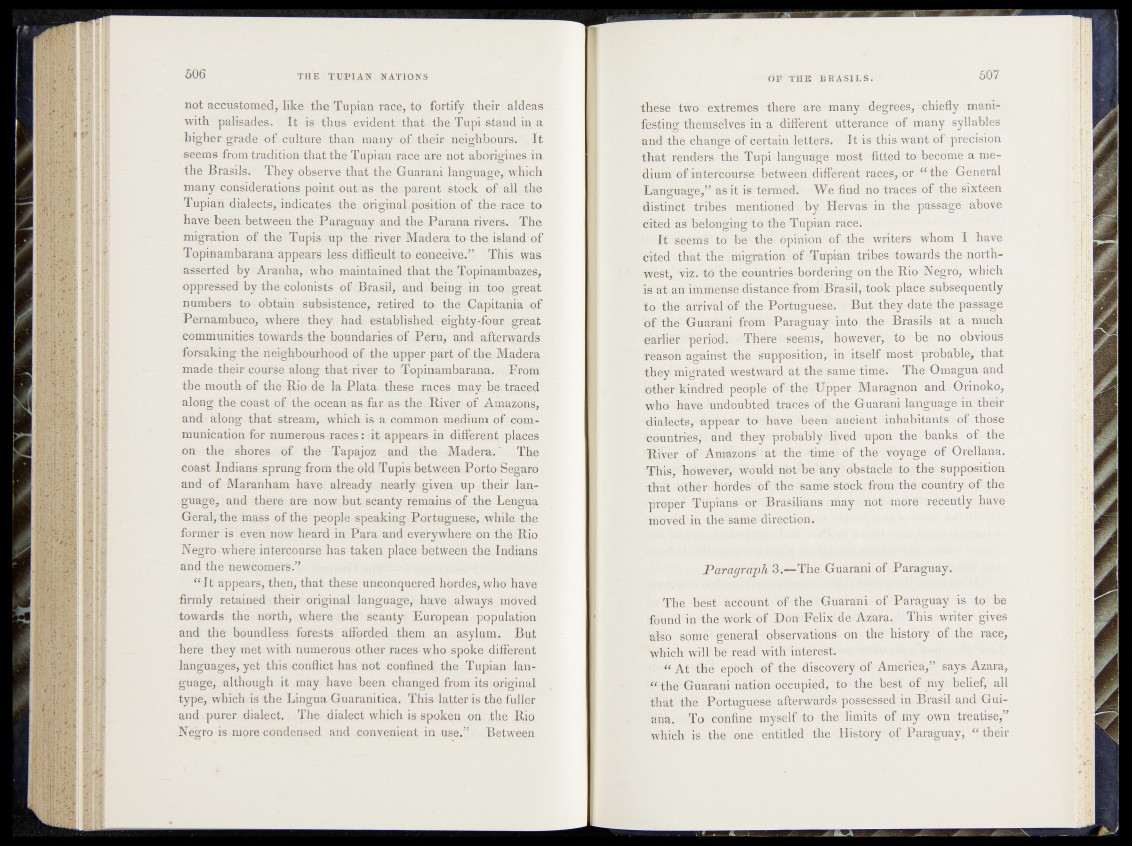
not accustomed, like 'the Tupian race, to fortify their aldeas
with palisades. It is thus evident that the Tupi stand in a
higher grade of culture than manyof their neighbours. \. It
seems from traditioa that the Tupiao;race are not aborigines ?in
the Brasils. They Observe that the Guarani language,, which
many considerations point out as the parent Stock of all the
Tupian dialects, indicates the original.position of the race to
have been between the Paraguay<and the Parana rivers* f The
migration of the Tupis up the river Madera to the island of
Topbaambarana appearsiless diffieult>to. eoneeiv®< ’ Thisf was
asserted by Aranha, who maintained that the Topinambazes,
oppressed by the colonists of Brasil, and being in .too,great
numbers to obtain ? subsistence, retired to thej iCarpitaoia of
Pernambuco, where theythad established feigh%nfoiar!(p-€|at
communities towards the boundaries of Peru, and afterwards
forsaking the neighbourhood of the upper part of the Madera
made their course along that river to Topinambarana.: nErQto
the mouth of the Rio de la Plata these races may be traced
along the coast of the ocean as far as the River, .pf.. Amazons,
and along that stream, which is a common medium, of . communication
for numerous-races: [it appears in different? places
on the shores of the Tapajoz g and- the Madera. ’ The
coast Indians sprung from the old Tupis between Porto Segaco
and of Maranham have already nearly given up their language,
and there are now but scanty remains of the Lengua
Geral, the mass of the'people speaking Portugpes^ yflfffefffe
former is even now heard in Para and everywhere on the Rio
Negro-where intercourse has taken place between the Indians
and the newcomers.”
“ It appears, then, that these unconquered hordes, who have
firmly retained their original language, have always moved
towards the north, where, the scanty European population
and the boundless; forests afforded them an asylum. B u t.
here they met with numerous other races who spoke different
languages, yet this conflict has not confined the Tupian language,
although it may; have been changed from its original
type, which is the Lingua Guaranitica. This latter is the fuller
and .purer dialeet. The dialect which is spoken on the Rio
Negro is more condensed and convenient in use.” Between
these two extremes there are many degrees, chiefly mani-
feSting themselves in a' different- utterance of many syllables
and the change of certain letters. It is this want of precision
that renders-the Tupi language Most fitted to become a me-
diunbof intercourse between different races, or > “„the General
Language,”* as it is termed^ We find no traces of the sixteen
distinct tribes mentioned1 - by Hervas in the passage above
dted as belonging to the Tupian race*
It !seems to bMthe opinion ôf }the writers whom I have
cited* that the ■migration of Tupian tribes towards the northwest,
viz. t*5 th© countries bordering 0®the Rio^Negrô1,, which
is at an immense distance fromlBrasil, took place subsequently
%o th^hMvhtvf the Portuguese-. But they dkte.the passage
of the Guarani from‘ Paraguay into the Brasils at a much
Earlier period. There ;,soenas, however,, to Be- no obvious
»reasoff ag^irtstrifce Supposition, in itself most * probable;, that
they: migrated westward at thë^samé time?. The Gmagua and
btherikliibé® people ofi^e'TIpper Maragnon and.iGrinoko,
who have undoubted traces »of ;the Guarani language in their
dialecte, -appear to have ibeeni: ancient inhabitants of those
*üoün-trié^ sind they'pfobafely lived upon th e b a n k s e f the
RiVer of Amazons*f at the time-'rif the vbyage of Orellana.
Thisj" hoWèVeri!AVëuM‘ not bbUny1*? obstacle to the. supposition
that rithér lhordes' io f the same stock footethë) courttry <©f the
proper Tüpïans -or BraMU&fttf ;-«4ay-- ^ûdtiimwôî^wtèeiitly have
moved in the same direction* : •
Paragraph 3.—The Guarani of Paraguay.
The best 'aOcoiMt of'the ^ Guarani »Oft Paraguay is to be
:found in the work of Do® >Felix;de - Azara. ‘ > ; TMs; Writer gives
also some general observatiOns oB! the history- of the race,
which will* be read witb intetesfejJ';
§f “ At thé épocb of5 thé êiscovëryöf America,^ say&Azara,
“ the Guarani nation occupied, to the;ibest Of. -my belief all
.that the Portuguese afterwards-possessed in Brasil and Guiana.
To confine Wysélf ’ tO the limits of my own treatise,”
which is the onl entitled the History of Paraguay, “ their